Czy kiedykolwiek próbowałeś otworzyć jeden ze swoich postów WordPress tylko po to, aby zostać powitanym przez błąd 404? Czasami doświadczamy tego, gdy pracujemy nad własnymi witrynami WordPress lub pomagamy naszym użytkownikom.
Błąd ten pojawia się, gdy można uzyskać dostęp do obszaru administracyjnego WordPress i bloga, ale przy próbie otwarcia konkretnego posta pojawia się komunikat “404 Not Found”.
Pozorne zniknięcie treści może być frustrujące, ale znaleźliśmy kilka obejść, które poprawią ten problem. W tym kompletnym przewodniku pokażemy, jak poprawić posty WordPress zwracające błędy 404.
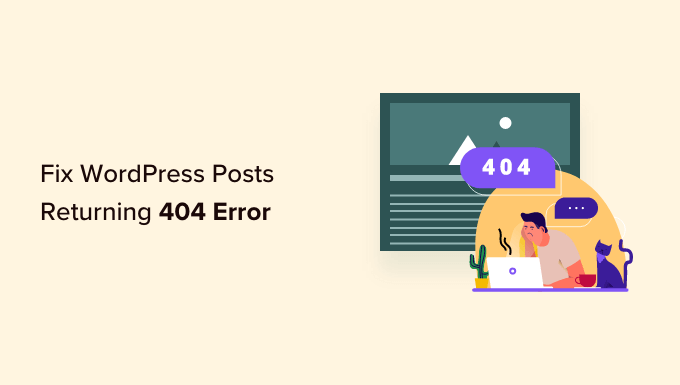
Dlaczego moje wpisy na WordPressie zwracają błąd 404?
Istnieje kilka powodów, dla których Twoje posty mogą wyświetlać błąd 404 “Nie znaleziono strony” w WordPress. Mogą one obejmować:
- Konflikty wtyczek lub motywów: Czasami wtyczki lub motywy, które zainstalowałeś na swojej witrynie, mogą zakłócać sposób, w jaki WordPress obsługuje bezpośrednie odnośniki. Może to prowadzić do niedziałających odnośników i błędów 404.
- Problemy z własnym kodem: Jeśli dodałeś niestandardowy kod do swojej witryny internetowej, mogą występować błędy w kodzie, które mają wpływ na bezpośrednie odnośniki lub powodują inne konflikty, powodując błędy 404 dla twoich wpisów.
- Problemy z plikiem .htaccess: Plik .htaccess odgrywa rolę w strukturze adresów URL WordPress. Jeśli plik ten jest uszkodzony lub go brakuje, może to prowadzić do błędów 404 dla postów lub stron.
Jak znaleźć wszystkie posty WordPress z błędem 404?
Zanim przejdziemy do rozwiązań, dobrze byłoby dowiedzieć się, czy ten błąd występuje tylko w jednym lub dwóch postach, czy w wielu postach. W ten sposób można określić zakres problemu i wybrać najbardziej odpowiednie rozwiązanie.
Jednym z łatwych sposobów, aby to sprawdzić, jest skorzystanie z Google Search Console. Jeśli jeszcze nie przesłałeś swojej witryny do Google Search Console, przeczytaj nasz przewodnik na temat dodawania witryny WordPress do Google Search Console.
Gdy bot Google zaindeksuje Twoją witrynę, Google Search Console dostarczy Ci szczegółowych informacji o jej wydajności, w tym o napotkanych błędach 404.
Aby dowiedzieć się, które posty zwracają błędy 404, możesz zalogować się do kokpitu Search Console. Następnie przejdź do raportu “Strony”, a zobaczysz szczegółową listę wszystkich błędów.
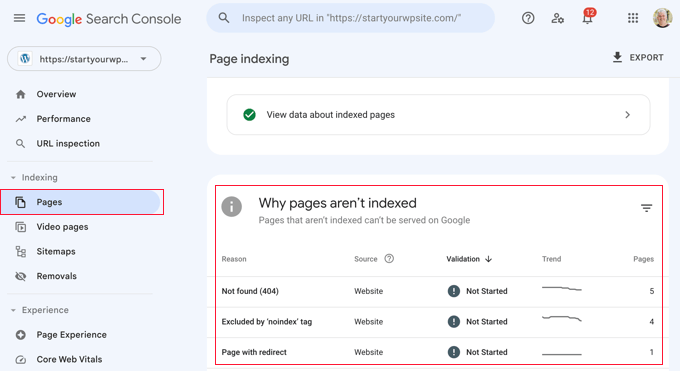
Aby uzyskać więcej informacji, możesz przeczytać naszą listę wskazówek dotyczących korzystania z Google Search Console w celu zwiększenia ruchu w witrynie, która zawiera kilka wskazówek, jak poprawić błędy 404 za pomocą tego narzędzia.
W związku z tym przyjrzyjmy się, jak poprawić wpisy WordPress zwracające błędy 404. Możesz skorzystać z poniższych odnośników, aby przejść bezpośrednio do różnych rozwiązań:
Nie masz czasu na samodzielne poprawki błędów 404? Usługi WPBeginner Pro mogą pomóc! Dzięki naszemu niedrogiemu wsparciu WordPress w nagłych wypadkach możesz zatrudnić ekspertów, którzy poprawią błędy 404, niedziałające linki, problemy z przekierowaniami i wiele więcej. Przestań stresować się problemami z WordPressem i popraw je! Zaplanuj awaryjną obsługę WordPress już dziś!
Metoda 1: Sprawdzenie konfliktów wtyczek lub motywów i problemów z własnym kodem
Czasami wtyczki, motywy lub niestandardowy kod dodany do witryny WordPress mogą zakłócać permalinki lub powodować konflikty, prowadząc do błędów 404. Doświadczyliśmy tego nawet sami podczas testowania narzędzi na naszej stronie demonstracyjnej.
Jednym ze sposobów rozwiązania tego problemu jest tymczasowe wyłączanie wtyczek. Wtyczki mogą czasami zakłócać sposób, w jaki WordPress obsługuje odnośniki.
Po wyłączeniu wtyczek możesz je ponownie aktywować, sprawdzając jednocześnie, czy błąd 404 pojawia się ponownie po włączaniu każdej z nich. Jeśli błąd pojawia się po włączaniu konkretnej wtyczki, to ona może być winowajcą.
Następnie można szybko wyszukać w Google rozwiązania związane z tą wtyczką lub skontaktować się z twórcą wtyczki w celu uzyskania obsługi.
Podobnie, twój motyw WordPress może powodować konflikt.
Aby to sprawdzić, możesz tymczasowo przełączyć się na domyślny motyw WordPress, taki jak Twenty Twenty-Three lub Twenty Twenty-Four. Wystarczy przejść do Wygląd “ Motywy i kliknąć “Włączanie” domyślnego motywu.

Jeśli błąd 404 zniknie z domyślnym motywem, oznacza to potencjalny konflikt z twoim obecnym, aktualnym motywem. Możesz wtedy spróbować rozwiązać problem z motywem lub rozważyć użycie innego motywu.
Możesz sprawdzić nasz ekspercki wybór najpopularniejszych motywów WordPress, aby uzyskać rekomendacje.
Jeśli niedawno wstawiłeś fragmenty kodu do twojej witryny internetowej, mogą występować błędy w kodzie powodujące błędy 404. Przyjrzyj się uważnie dodanemu kodowi i sprawdź, czy możesz zidentyfikować jakieś błędy.
Najbezpieczniejszym sposobem dodawania fragmentów kodu do WordPressa jest użycie wtyczki WPCode. Wtyczka ta pozwala wstawić własny kod bez bezpośredniej pracy z plikami motywu, zmniejszając ryzyko zepsucia twojej witryny internetowej.
Ponadto, gdy WPCode wykryje błąd w twoim kodzie, automatycznie wyłączy fragment kodu i poprosi cię o jego sprawdzenie. Możesz również użyć trybu testowego, aby sprawdzić, czy twój kod działa, zanim prześlesz go do swojej witryny internetowej.
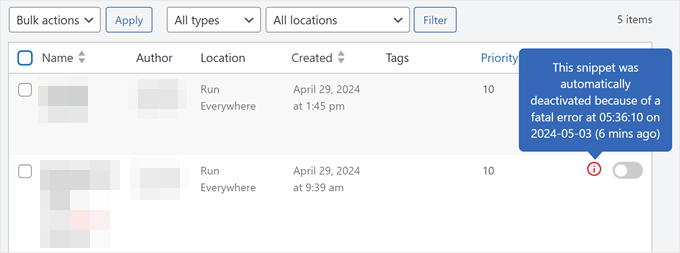
Jeśli żadne z tych rozwiązań nie zadziała, przejdź do następnej metody, w której rozwiążemy problemy z ustawieniami twojego bezpośredniego odnośnika.
Metoda 2: Popraw ustawienia twojego permalinka
Wpisy WordPress mogą zwracać błędy 404 z powodu problemów z regułami przepisywania w twoim pliku .htaccess. W większości przypadków możesz poprawić ten problem, aktualizując ustawienia bezpośredniego odnośnika.
Po prostu przejdź do Ustawienia ” Bezpośrednie odnośniki w twoim panelu administracyjnym WordPress i kliknij przycisk “Zapisz zmiany”.
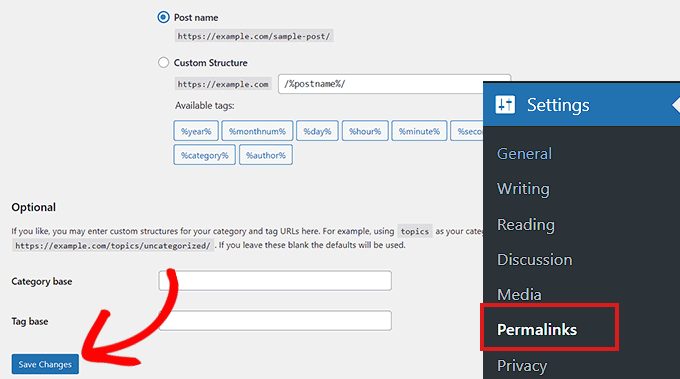
Nie ma potrzeby wprowadzania zmian w samych ustawieniach bezpośrednich odnośników. Zaktualizuje to twoje ustawienia bezpośredniego odnośnika i wyczyści reguły przepisywania.
W większości przypadków rozwiązanie to poprawi błąd 404 wpisów WordPress. Jeśli jednak nie działa ono w twoim przypadku, to prawdopodobnie musisz ręcznie zaktualizować swój plik .htaccess.
Metoda 3: Aktualizacja pliku .htaccess WordPressa
Zanim zaczniesz, upewnij się, że najpierw wykonałeś kopię zapasową twojego pliku .htaccess WordPress. Jeśli coś pójdzie nie tak, możesz łatwo przywrócić oryginalny plik.
Teraz musisz połączyć się z twoim serwerem za pomocą klienta FTP, takiego jak FileZilla lub aplikacji File Manager w kokpicie hostingu WordPress.
Następnie należy znaleźć i edytować plik .htaccess, który znajduje się w tej samej lokalizacji co katalogi takie jak /wp-content/ i /wp-includes/.
Wystarczy kliknąć plik prawym przyciskiem myszy i wybrać opcję “Uprawnienia pliku”.
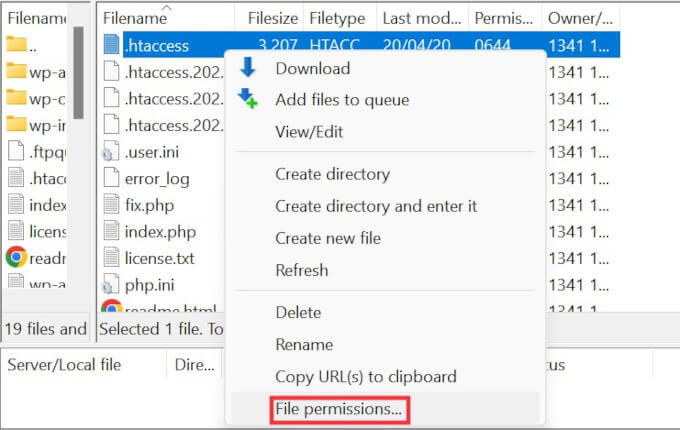
Plik można zapisać, zmieniając jego uprawnienia na 666.
Po prostu wpisz “666” w polu “Wartość liczbowa”, a następnie kliknij “OK”.
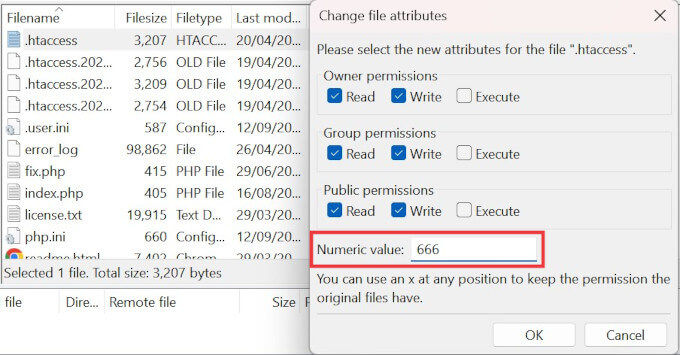
Następnie należy powtórzyć kroki z pierwszej metody naszego poradnika. Po wykonaniu tej czynności nie zapomnij zmienić uprawnień z powrotem na 660.
Można również edytować plik i dodawać do niego kod.
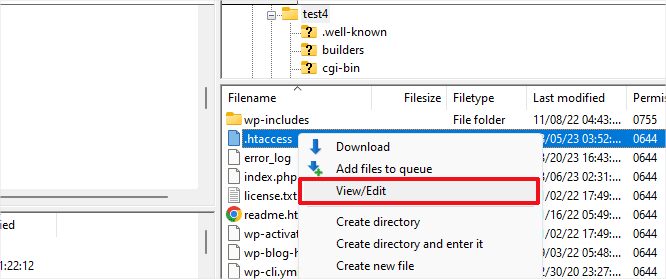
Po otwarciu pliku .htaccess za pomocą edytora tekstu, wystarczy wstawić ten kod:
1 2 3 4 5 6 7 8 9 10 | # BEGIN WordPress<IfModule mod_rewrite.c>RewriteEngine OnRewriteBase /RewriteRule ^index\.php$ - [L]RewriteCond %{REQUEST_FILENAME} !-fRewriteCond %{REQUEST_FILENAME} !-dRewriteRule . /index.php [L]</IfModule># END WordPress |
Metoda 4: Skontaktuj się z dostawcą hostingu
Jeśli żadne z powyższych rozwiązań nie naprawiło błędu 404 zwracającego wpisy WordPress, zalecamy skontaktowanie się z dostawcą hostingu WordPress. Może to być błąd po ich stronie lub mogą oni pomóc w rozwiązaniu problemu.
Zapoznaj się również z naszym przewodnikiem na temat tego, jak prawidłowo poprosić o pomoc techniczną WordPress i ją uzyskać.
Metoda 5: Włącz mod-rewrite (lokalna instalacja WordPress)
Jeśli używasz regionalnego serwera do celów testowych, musisz włączyć mod_rewrite w konfiguracji Apache twojej witryny MAMP, WAMP lub XAMPP.
Pozwoli to WordPressowi na generowanie czystych adresów URL i zapobiegnie błędowi 404 dla wpisów i stron na twoim serwerze lokalnym.
Sposób wykonania tej czynności zależy od używanej platformy. Osoby korzystające z XAMPP mogą otworzyć swój panel sterowania i kliknąć przycisk “Konfiguracja” w ramach działań. Następnie należy wybrać “Apache (httpd.conf)”.
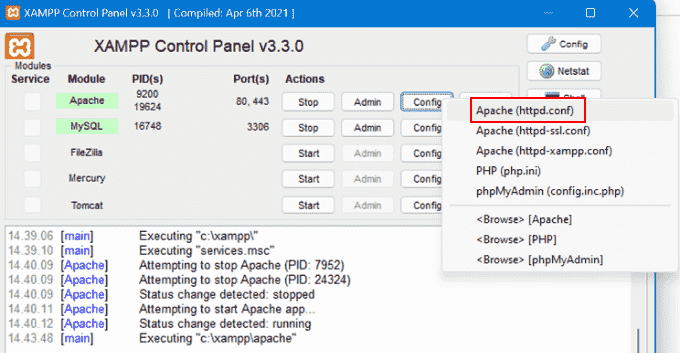
Następnie należy znaleźć linię #LoadModule rewrite_module modules/mod_rewrite.so i usuwać ‘#’, aby ją odkomentować.
Spowoduje to wczytywanie mod_rewrite.
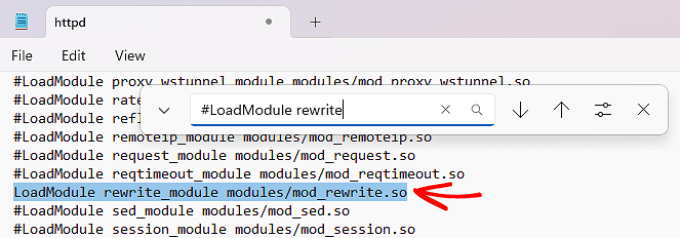
Następnie znajdź wszystkie instancje AllowOverride None i zmień je na AllowOverride All.
Wartość “All” oznacza, że wszystkie dyrektywy mogą zostać zastąpione.
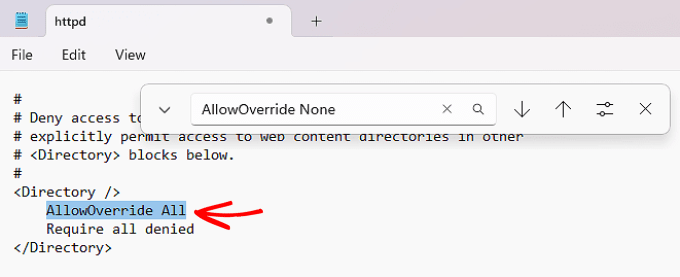
Po zakończeniu można zapisać plik httpd.conf i zamknąć go. Następnie w panelu sterowania XAMPP kliknij “Stop” na module Apache i “Start” ponownie, aby go ponownie uruchomić.
Następnie wróć do kokpitu administratora, aby sprawdzić, czy twoje bezpośrednie odnośniki działają.
Film instruktażowy
Jeśli potrzebujesz instrukcji wizualnych, obejrzyj poniższy film.
Mamy nadzieję, że ten artykuł pomógł Ci rozwiązać problem postów zwracających błędy 404 w WordPress. Możesz również zapoznać się z naszym przewodnikiem po najczęstszych błędach WordPress i sposobach ich poprawki, a także z naszymi eksperckimi propozycjami najlepszych wtyczek WordPress do rozwoju Twojej witryny.
If you liked this article, then please subscribe to our YouTube Channel for WordPress video tutorials. You can also find us on Twitter and Facebook.





Mario Nwolisah
Thank you! It worked. I really appreciate.
WPBeginner Support
Glad our article was helpful!
Admin
Jess
Thank you – this saved me!
WPBeginner Support
Happy to hear our guide could help!
Admin
Cristian
Thank you, it works for me!!!
WPBeginner Support
Glad our recommendations were able to assist!
Admin
Samir K Al Busaidy
I was panicking and thinking that my website was hacked or had malware. As I read your writing and you wrote not to worry, I began to relax. The first option (permalink) worked for me immediately…
Thanks
WPBeginner Support
Glad our guide was able to help
Admin
Udaykumar Posia
This worked. Thank you so much.
WPBeginner Support
Glad our guide could help
Admin
Max Legault
On IIS there is no .htaccess file but the key is still the permalink settings. Just hitting Save didn’t fix it but changing the Custom Structure to Plain worked like a charm. Thanks for the push in the right direction.
WPBeginner Support
Glad you were able to find the solution for your issue
Admin
Collin
I love you for this! This was an easy fix. I was in full panic mode!
WPBeginner Support
Glad our guide was able to help
Admin
Zack
Thank you so much. It worked!
WPBeginner Support
Glad our guide was helpful
Admin
Steve Barnard
Dang! Can’t thank you enough for this – super simple fix worked perfectly – just hit save changes on the permalinks settings page and viola’ – my pages are back. Thank you!!
WPBeginner Support
Glad our guide could help
Admin
A.S.M. Arifur Rahman
Thanks a lot, settings saved method works, Now my post open fine.
kris
honestly thank you so much! without fail your site always comes thru with answers that work. thank you so much!
(now I just wish I knew what caused it to get out of whack in the first place. oh well.)
Chris
This article just saved me from a panic attack Lol. The solution worked great. Thanks for making this video.
Muhammad Tahir
i didn’t solve this issue by using all the methods that you are discussed?
WPBeginner Support
If none of our methods in this guide worked for you, we would recommend reaching out to the support for your hosting provider to ensure there is not an error on their end.
Admin
Duane Wiese
None of the above suggestions worked so I did some further searching. I came across someone who suggested switching off the mod security under the security section in cpanel.
I tried this and it worked. I also tested it by switching it back on after a change and then trying another change and BAM, 404 error.
WPBeginner Support
Thanks for sharing this should someone else run into this issue. Not every host allows access to that specific file but if you reach out to your host they can normally disable or change it for you
Admin
Dave Emma
Disabling ModSecurity fixed mine.
I actually tried permalinks plus rewriting .htaccess, but that didn’t solve my problem. I’m glad I read comments. Many thanks guys for sharing.
Elango
Thanks, it was so simple and the problem solved. No other pages were visible after I migrated to another server. I added the lines to .htaccess file and uploaded the same. Now all the pages are being displays without the 404 error and I am able to access my WP dashboard too. Thanks a lot.
WPBeginner Support
Glad our guide was able to help
Admin
Islombek
My posts are showing 404 error after installing ssl certificate. How can I fix it? I tried everything mentioned above, but none helped.
WPBeginner Support
If you are changing your site’s URL to HTTPS you would want to follow our guide below:
https://www.wpbeginner.com/wp-tutorials/how-to-add-ssl-and-https-in-wordpress/
Admin
Dennis Yildirim
My .htaccess file is exactly the same with that code but nevertheless I did whatever in the post. did not work, saved permalinks through admin console, did not work. Manually edits, no luck. Deleted the .htaccess and recreated it by saving it from admin console, again did not work. Nothing works. Don’t know how did it even work on others?
WPBeginner Support
If none of the recommendations from our article were able to help we would recommend reaching out to your hosting provider as that can be a sign that there is an issue on your host’s end.
Admin
Kuldeep Singh
You saved my day. I got this issue after transferring my site from one hosting to another. I couldn’t believe it was so simple to fix the issue. Many Thanks WpBeginner team!
WPBeginner Support
Glad our guide was helpful
Admin
Rick
I never reply to these things but just wanted to jump on here and say thank you! I’ve been having this issue a lot and having to wait ages for support to help me and so finally had a hunt around, found this, and can now fix it myself. You legend!! Much appreciated
WPBeginner Support
Glad our guide was helpful
Admin
Elroy
Thanks a lot Wpbeginner it woked just fine.
WPBeginner Support
Glad our guide was helpful
Admin
Noble
Thank you very much, it worked instantaneously!
WPBeginner Support
Glad our guide could help
Admin
carol hannah
Help! It didn’t work and I can’t possibly work out how to do the .htaccessfile thingy?
WPBeginner Support
You would either need to use FTP which we cover on the page below:
https://www.wpbeginner.com/glossary/ftp/
Or reach out to your hosting provider and they would be able to assist.
Admin
Christopher Krohn
Thank you, thank you, thank you!
WPBeginner Support
Glad our guide was helpful
Admin
Dan
Man this fixed my WP site! THANK YOU!
WPBeginner Support
Glad our guide was helpful
Admin
Molly
Thank you for a million time!!!!!
WPBeginner Support
Glad our guide was helpful
Admin
Amin Omer
Thank you very much
WPBeginner Support
You’re welcome
Admin
Afan
One of solutions to correct the issue with the Permalink change is simply delete the .htaccess file – WordPress will recreate it again automatically.
But, before you delete it, copy the file on your computer, just in case…
WPBeginner Support
If someone has customized their htaccess file then that would be a good idea. Otherwise, WordPress should auto regenerate the default information in the file where most wouldn’t need to worry.
Admin
James Monroe
Saving the permalinks settings worked perfectly. Such a simple solution to what looked like a serious problem! Thank you!
WPBeginner Support
Glad our recommendation was helpful
Admin
mukhtar
its works fine 100 %
and easy to solve my problem, we are very very thankful to you about it
WPBeginner Support
Glad our guide was helpful
Admin
Sarah
Wow!! I’ve spent all evening trying to fix this and that’s how easy it was! THANK YOU!!
WPBeginner Support
Glad our guide was helpful
Admin
Rimzan farook
Thanks fixed it as you described changed my post date to post name, thanks a ton
WPBeginner Support
Glad our recommendations could help
Admin
Muhammad Zeeshan
I’m facing 404 error while adding new plugin , theme , editing any post or product, editing any page ..
I’ve try to save permalinks and also tried to change .htaccess .. But not this given solution is working for me.
WPBeginner Support
You would want to reach out to your hosting provider to see if you are running into any errors on their server’s end.
Admin
Ayobami
I’m having error 404 issues on my website, I can’t access to the website at all what can I do?
WPBeginner Support
You would use the htaccess method from this guide or reach out to your hosting provider to be able to assist you
Admin
samith
I can’t login my WP dashboard seen “nginx 404 not found error”
WPBeginner Support
For that specific error, you would want to reach out to your hosting provider to take a look.
Admin
Sammy
A BIG Thank You… It solved the headache!
WPBeginner Support
Glad our guide was helpful
Admin
Mihir
I’m facing a problem where this is extension of my own website after every page and I don’t know how to fix it.
WPBeginner Support
You would likely want to check under Settings>Permalinks to ensure everything is set correctly there
Admin
Daniel
Thank you,
It solved my problem!
WPBeginner Support
Glad our guide was helpful
Admin
Mellissa
This is a great solution but it didn’t fix my issue so in case anyone else is in the same boat, here’s what went wrong for me; my index.php file went missing from the server. Added a new copy and everything is back
WPBeginner Support
Thanks for sharing what worked for you
Admin
Brahim
thank you, that help a lot
WPBeginner Support
You’re welcome
Admin
Logan
Thanks for your articles. My issue is that I can’t log in to my website even though I’m logged in to the host server… When I try to log in my wordpress the message goes :
Not Found
The requested URL was not found on this server.
My website isn’t published yet as I’ve just started.
WPBeginner Support
You would want to check with your hosting provider to ensure there isn’t an issue on their end or where your site is installed
Admin
Danish
My main page is working but all other pages are showing 404 error. They are visible in admin panel but can’t view them.
WPBeginner Support
If the method from our guide above were unable to assist you, you would want to go through our troubleshooting steps below:
https://www.wpbeginner.com/beginners-guide/beginners-guide-to-troubleshooting-wordpress-errors-step-by-step/
Admin
Peck-Secia Tangi
Hi,
Below is the error that i am getting which is similar to the one described above
“The requested URL was not found on this server.”
WPBeginner Support
For that error, if you haven’t done so already you would want to reach out to your hosting provider to see if the error could be server related.
Admin
Kathryn
This worked beautifully. Thank you!
WPBeginner Support
You’re welcome, glad it helped
Admin
Parvinder Singh
Yes, WPBEGINNER rocks !!!!
WPBeginner Support
Glad our guides were helpful
Admin
clay
Crazy how helpful this article is. Such a simple solution to a very frustrating problem.
WPBeginner Support
Glad we could help make the solution easy
Admin
Shoeb Khan
This is very helpful thank you.
WPBeginner Support
You’re welcome
Admin
Calvin
I’m having the same problem with category links. They return a 404 error and it’s a new website. I’m afraid not all pages are going to be indexed.
WPBeginner Support
This same solution should work, you may also want to take a look at our troubleshooting guide below:
https://www.wpbeginner.com/beginners-guide/beginners-guide-to-troubleshooting-wordpress-errors-step-by-step/
Admin
Oluebube
This was very helpful…
WPBeginner Support
Glad our guide was helpful
Admin
Dominus MMP
Thanks, this was helpful for me.
WPBeginner Support
Glad our guide was helpful
Admin
Ian
I just build my website. I was able to go into dashboard. I changed the url (IP address) to my domain. Now mydomain.com and mydomain.com/wp-admin give me “Not Found”.
Any suggestions? Thanks.
WPBeginner Support
If your site is on your hosting provider you would want to reach out to your host’s support to ensure the site is in the correct location and your domain is pointing correctly.
Admin